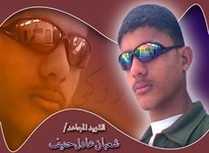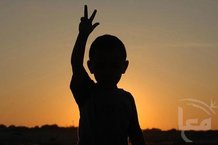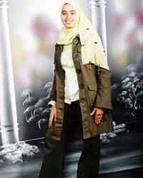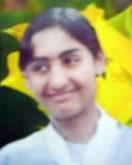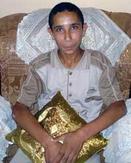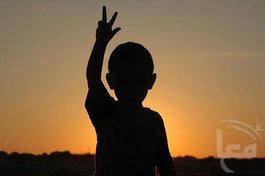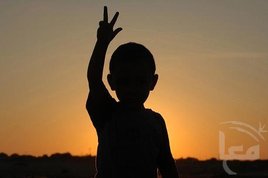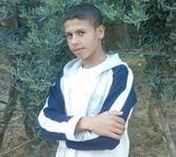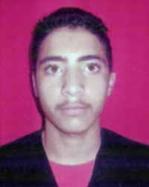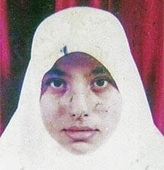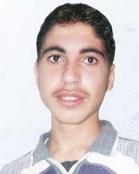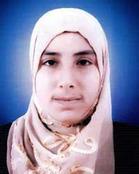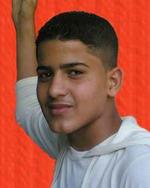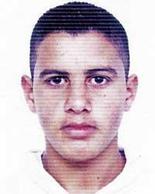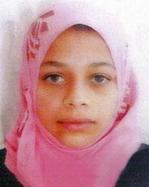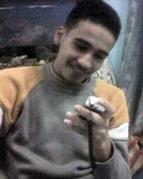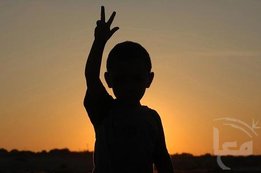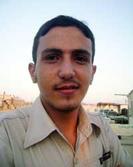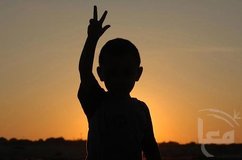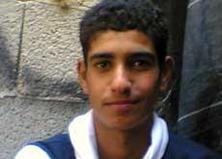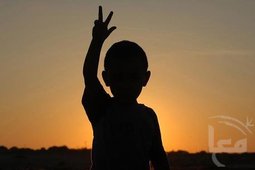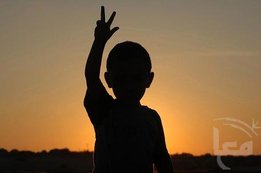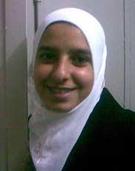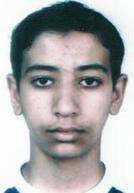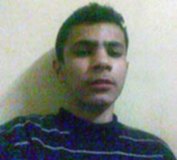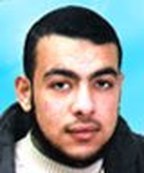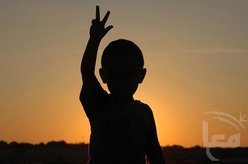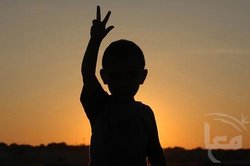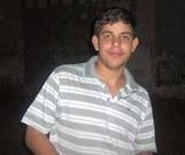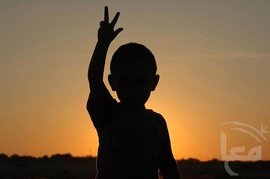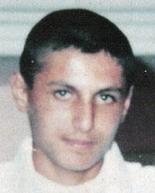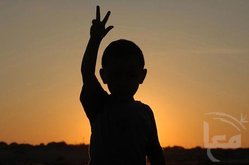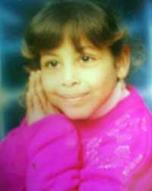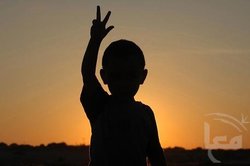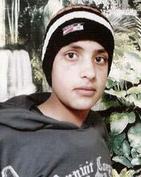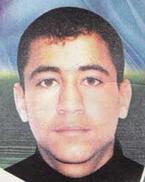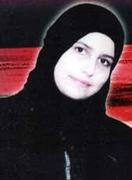OPERATION CAST LEAD 27 DEC 2008-18 JAN 1009
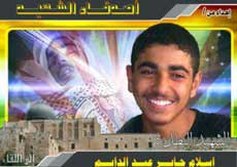
Islam ‘Abd a-Dayem 16
Died of his wounds 08-01-09
Killed by flechette-shell darts while in a condolence tent. Five other persons were killed in the incident. 05-01-09
The year 2008 started with more Israeli aggression than ever before.
The war on Gaza was repeating itself savagely every day at that cold winter.
However, these conditions didn’t prevent Islam, 16 years old, from taking part in the consolation occasion of his cousin Arafa, who martyred some days before.
In such circumstances, a consolation lasts for a number of days, to let all relatives and acquaintances to get the chance to take part.
Islam was there taking care of the consolers’ requests. No one thought for a moment that the Israeli missiles would target such house full of consolers and civilians.
But they were wrong….
The first day passed peacefully, although the turmoil of Israeli bombarding was surrounding Beit Hanoun from all directions.
But at the second day, a strike by a missile of an Israeli reconnaissance aircraft attacked the house of consolation. Tens of the family sons and consolers were injured or killed. It was a real dilemma, where all victims were lying on the ground, shot by the missile.
This happened on the 5th of January. At that day, Islam wasn’t martyred. However, he was badly injured; carried immediately to the hospital.
But after three days of pain and suffering in the intensive care department, Islam passed away.
Failing to hide her deep sadness, Islam’s mother tried to talk about her favorite son. She started by saying “I feel so sad and sorry that I didn’t have the chance to enjoy looking at Islam’s face to the last moment of his life. They killed him in a horrible way, without doing anything. He was so depressed that death separated between him and his cousin, but he joined him two days later; Glory to God and Sufficient unto us is God!”
Islam was a student in the second secondary class. He was in a good educational level. He had the intention to finish his secondary school and join the university.
His brother, Mizer, said “Islam was the most active kid among us. He was taking care about our home needs. He was beating all of us in working in our small agricultural piece of land. He was fixing everything, even cars. He was really talent and magnificent.”
Died of his wounds 08-01-09
Killed by flechette-shell darts while in a condolence tent. Five other persons were killed in the incident. 05-01-09
The year 2008 started with more Israeli aggression than ever before.
The war on Gaza was repeating itself savagely every day at that cold winter.
However, these conditions didn’t prevent Islam, 16 years old, from taking part in the consolation occasion of his cousin Arafa, who martyred some days before.
In such circumstances, a consolation lasts for a number of days, to let all relatives and acquaintances to get the chance to take part.
Islam was there taking care of the consolers’ requests. No one thought for a moment that the Israeli missiles would target such house full of consolers and civilians.
But they were wrong….
The first day passed peacefully, although the turmoil of Israeli bombarding was surrounding Beit Hanoun from all directions.
But at the second day, a strike by a missile of an Israeli reconnaissance aircraft attacked the house of consolation. Tens of the family sons and consolers were injured or killed. It was a real dilemma, where all victims were lying on the ground, shot by the missile.
This happened on the 5th of January. At that day, Islam wasn’t martyred. However, he was badly injured; carried immediately to the hospital.
But after three days of pain and suffering in the intensive care department, Islam passed away.
Failing to hide her deep sadness, Islam’s mother tried to talk about her favorite son. She started by saying “I feel so sad and sorry that I didn’t have the chance to enjoy looking at Islam’s face to the last moment of his life. They killed him in a horrible way, without doing anything. He was so depressed that death separated between him and his cousin, but he joined him two days later; Glory to God and Sufficient unto us is God!”
Islam was a student in the second secondary class. He was in a good educational level. He had the intention to finish his secondary school and join the university.
His brother, Mizer, said “Islam was the most active kid among us. He was taking care about our home needs. He was beating all of us in working in our small agricultural piece of land. He was fixing everything, even cars. He was really talent and magnificent.”
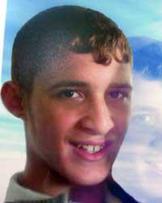
Iyad Shhadeh 16
Killed 12-01-09
Critically wounded while next to the Abu al-Khir mosque in the city, and died the next day.
Iyad Shehadah lived with his family in Jabalia, Northern Gaza. The situation in their area deteriorated with the beginning of the ground invasion of Gaza on 3 January 2009.
On Sunday, 11 January 2009, at around 4:30pm, Eyad left the house with a bag for his brother, who had left the house since the beginning of the war.
Around two hours later, he came back to the house. He was chocking. He said shells had landed near him when he was on his way back home and he had inhaled smoke.
His father asked the family to leave Eyad to rest, not suspecting his condition was serious. However, Eyad continued to choke and started vomiting.
At around 8:00pm, a neighbour drove Eyad to the hospital in Jabalia. Due to the gravity of his condition, he was transferred to Shifa Hospital in Gaza City for treatment.
While he was in the intensive care unit, the doctors informed his family that he had inhaled white phosphorous, and his respiratory system had melted.
He died on 12 January at 7:30pm.
Killed 12-01-09
Critically wounded while next to the Abu al-Khir mosque in the city, and died the next day.
Iyad Shehadah lived with his family in Jabalia, Northern Gaza. The situation in their area deteriorated with the beginning of the ground invasion of Gaza on 3 January 2009.
On Sunday, 11 January 2009, at around 4:30pm, Eyad left the house with a bag for his brother, who had left the house since the beginning of the war.
Around two hours later, he came back to the house. He was chocking. He said shells had landed near him when he was on his way back home and he had inhaled smoke.
His father asked the family to leave Eyad to rest, not suspecting his condition was serious. However, Eyad continued to choke and started vomiting.
At around 8:00pm, a neighbour drove Eyad to the hospital in Jabalia. Due to the gravity of his condition, he was transferred to Shifa Hospital in Gaza City for treatment.
While he was in the intensive care unit, the doctors informed his family that he had inhaled white phosphorous, and his respiratory system had melted.
He died on 12 January at 7:30pm.
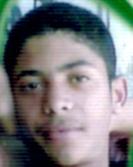
Nabil Abu Ta’imah 16
Killed 28-12-08
Killed while returning with his brother from their farmland, which lies about 900 meters from the Perimeter Fence. The brother was wounded and taken to Egypt for treatment.
In the early morning of 28 December 2008 Mahmoud Abu Taima, his wife Manal, and their two oldest sons, Khalil and Nabil were collecting zucchini from their lands in Khuza’a village, east of Khan Younis. After a few hours the two brothers went to their uncle’s farmland a few hundred meters further west. At around 8:30 the Israeli army fired a shell from the border fence which landed between the two boys. Nabil (16) was killed and Khalil was critically injured.
“You must understand, the area was very calm. Many farmers were working on their lands. It is an open area. I saw a projectile coming from the border fence towards the farm lands. Then I heard the explosion. I immediately ran towards the place of impact because I knew my sons were in that area. By the time that I arrived, people had already put the boys on a donkey cart to bring them to the hospital,” recalls Mahmoud Abu Taima (40). Khalil was critically injured by shrapnel in the chest and limbs and underwent a life saving surgery immediately after arriving in the hospital. “While we buried Nabil we were expecting that they would bring Khalil’s body from the hospital too,” says the boys’ mother Manal (37).
The Abu Taima family, who have their home in Abasan village, east of Khan Yunis, has been traumatized by the death of their son and brother Nabil. His parents, and 6 eldest siblings Khalil (20), Naima (18), Isra’ (15), Mohammed (14), Abdel Rahman (9), and Ibrahim (6 ) all have dear memories of him. “Nabil was a part of us and he had a big place in my heart. I remember him in every moment and I feel that he is present with us. Like now, when I drink tea, I remember him and feel that he is present. When I eat my meals I feel as if he is still here with us. I can never forget him,” says his father Mahmoud.
“Nabil’s mind was older than his age,” says Manal, “he was very clever at school and all of his teachers and the students liked him a lot. On the anniversary date of his death, his teachers and friends come to visit us. Besides going to school, Nabil liked to breed rabbits. Until his death we had about 50 rabbits. Since his death they died and we stopped getting new ones. We don’t feel like it anymore, now that he is not here.” Ibrahim (6 ) and Abdel Rahman(9) had a very close relationship with Nabil. Manal says: “They were badly affected by his death. They wanted to take the shovel and open his grave so they could take him from his grave and bring him to a doctor for treatment. Ibrahim was upset and stressed for a long time so I took him to a psychologist. When I told the children that a human rights organization was coming to talk to us Ibrahim asked me if they would bring Nabil.”
Khalil has spent the past years trying to recover from his physical injuries. “After 3 days I was transferred to Egypt for additional surgery. In the months after that I went to Médicines sans Frontières after finishing school and had 3 hour sessions of physiotherapy. I had very long days. Despite everything, there is still shrapnel inside my legs, chest and arms which cannot be removed. There are places in my left leg in which I can’t feel anything. My ankles always hurt and I can’t move the way I did before. My mobility, including my walking, has been affected. I can’t do everything that I want. For example, nowadays I play football alone because I am too afraid someone will hit my leg and I will be in agony.”
Besides his physical injuries, Khalil is trying to deal with the loss of his brother and the trauma of the incident. “We would always go to school and other places together. I feel as if I lost a part of my body. It is difficult to continue my life without this part. During the war it was my ‘tawjihi’[final high school] year and I had to go to school. I was traumatized after the incident. When I was sleeping I could hear the sound of a missile coming towards me. Somehow, I passed the tawjihithat year and am in university now.” Manal adds that Khalil used to have panic attacks after the incident, “even the sound of birds could make him have a panic attack.”
A few days after the attack, Israeli bulldozers destroyed the farmland belonging to the Abu Taima family, approximately 700 meters away from the fence. “We had zucchini crops, and a small storage room for fertilizers and equipment. We also had a water pump and water irrigation network. It is all destroyed now. We were unable to go to our farm for 2 years as it was too dangerous. Now we go again, despite the Israeli army shooting towards us. It is difficult. Since the death of my son I lost my motivation to work in the land,” says Mahmoud.
Mahmoud does not dare to have hopes or expectations for the future anymore: “living under occupation means that whatever hopes we have, it will fall apart one day. For example, you bring up your child and put all of your hopes in him or her, but then they come and kill your child and all your hopes are destroyed. We try to think about the future and have long-term hopes but it’s not possible for us.”
The family is not optimistic of the chances that they will see a court case against those responsible for their son’s death. “Nabil was not the first and last one who was killed by the army. Many boys like him were killed. Even if they [Israel] can capture the soldier who fired the shell, they will say he is insane,” says Mahmoud.
PCHR submitted a criminal complaint to the Israeli authoritiess on behalf of the Abu Taima family on 2 July 2009. To-date, no response has been received.
Killed 28-12-08
Killed while returning with his brother from their farmland, which lies about 900 meters from the Perimeter Fence. The brother was wounded and taken to Egypt for treatment.
In the early morning of 28 December 2008 Mahmoud Abu Taima, his wife Manal, and their two oldest sons, Khalil and Nabil were collecting zucchini from their lands in Khuza’a village, east of Khan Younis. After a few hours the two brothers went to their uncle’s farmland a few hundred meters further west. At around 8:30 the Israeli army fired a shell from the border fence which landed between the two boys. Nabil (16) was killed and Khalil was critically injured.
“You must understand, the area was very calm. Many farmers were working on their lands. It is an open area. I saw a projectile coming from the border fence towards the farm lands. Then I heard the explosion. I immediately ran towards the place of impact because I knew my sons were in that area. By the time that I arrived, people had already put the boys on a donkey cart to bring them to the hospital,” recalls Mahmoud Abu Taima (40). Khalil was critically injured by shrapnel in the chest and limbs and underwent a life saving surgery immediately after arriving in the hospital. “While we buried Nabil we were expecting that they would bring Khalil’s body from the hospital too,” says the boys’ mother Manal (37).
The Abu Taima family, who have their home in Abasan village, east of Khan Yunis, has been traumatized by the death of their son and brother Nabil. His parents, and 6 eldest siblings Khalil (20), Naima (18), Isra’ (15), Mohammed (14), Abdel Rahman (9), and Ibrahim (6 ) all have dear memories of him. “Nabil was a part of us and he had a big place in my heart. I remember him in every moment and I feel that he is present with us. Like now, when I drink tea, I remember him and feel that he is present. When I eat my meals I feel as if he is still here with us. I can never forget him,” says his father Mahmoud.
“Nabil’s mind was older than his age,” says Manal, “he was very clever at school and all of his teachers and the students liked him a lot. On the anniversary date of his death, his teachers and friends come to visit us. Besides going to school, Nabil liked to breed rabbits. Until his death we had about 50 rabbits. Since his death they died and we stopped getting new ones. We don’t feel like it anymore, now that he is not here.” Ibrahim (6 ) and Abdel Rahman(9) had a very close relationship with Nabil. Manal says: “They were badly affected by his death. They wanted to take the shovel and open his grave so they could take him from his grave and bring him to a doctor for treatment. Ibrahim was upset and stressed for a long time so I took him to a psychologist. When I told the children that a human rights organization was coming to talk to us Ibrahim asked me if they would bring Nabil.”
Khalil has spent the past years trying to recover from his physical injuries. “After 3 days I was transferred to Egypt for additional surgery. In the months after that I went to Médicines sans Frontières after finishing school and had 3 hour sessions of physiotherapy. I had very long days. Despite everything, there is still shrapnel inside my legs, chest and arms which cannot be removed. There are places in my left leg in which I can’t feel anything. My ankles always hurt and I can’t move the way I did before. My mobility, including my walking, has been affected. I can’t do everything that I want. For example, nowadays I play football alone because I am too afraid someone will hit my leg and I will be in agony.”
Besides his physical injuries, Khalil is trying to deal with the loss of his brother and the trauma of the incident. “We would always go to school and other places together. I feel as if I lost a part of my body. It is difficult to continue my life without this part. During the war it was my ‘tawjihi’[final high school] year and I had to go to school. I was traumatized after the incident. When I was sleeping I could hear the sound of a missile coming towards me. Somehow, I passed the tawjihithat year and am in university now.” Manal adds that Khalil used to have panic attacks after the incident, “even the sound of birds could make him have a panic attack.”
A few days after the attack, Israeli bulldozers destroyed the farmland belonging to the Abu Taima family, approximately 700 meters away from the fence. “We had zucchini crops, and a small storage room for fertilizers and equipment. We also had a water pump and water irrigation network. It is all destroyed now. We were unable to go to our farm for 2 years as it was too dangerous. Now we go again, despite the Israeli army shooting towards us. It is difficult. Since the death of my son I lost my motivation to work in the land,” says Mahmoud.
Mahmoud does not dare to have hopes or expectations for the future anymore: “living under occupation means that whatever hopes we have, it will fall apart one day. For example, you bring up your child and put all of your hopes in him or her, but then they come and kill your child and all your hopes are destroyed. We try to think about the future and have long-term hopes but it’s not possible for us.”
The family is not optimistic of the chances that they will see a court case against those responsible for their son’s death. “Nabil was not the first and last one who was killed by the army. Many boys like him were killed. Even if they [Israel] can capture the soldier who fired the shell, they will say he is insane,” says Mahmoud.
PCHR submitted a criminal complaint to the Israeli authoritiess on behalf of the Abu Taima family on 2 July 2009. To-date, no response has been received.
